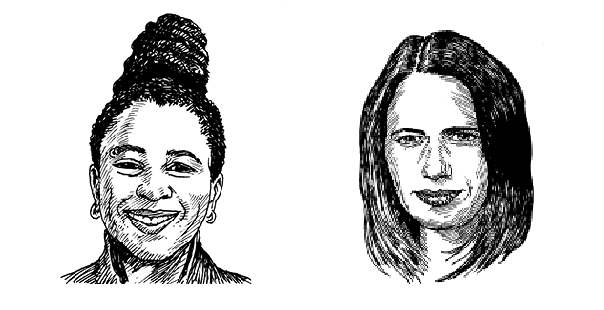I don’t remember when I first met Renee Gladman, but I’ve owned her books, and the ones she has published under her imprints, Leroy and Leon Works, since the time I remember learning the terms experimental writing and small press, both of which incompletely represent our overlapping literary worlds. Renee’s presence as an influential black lesbian writer and publisher both resisted and revealed the comparative whiteness of the community I found myself entering. I loved her sentences and her mind; I became a fan. Our friendship began a decade ago in the Bard MFA program, where, as faculty colleagues and housemates, we fell into the kind of ongoing conversation that living together allows, where a debate about which books to recommend to a student gives way to a shared recipe, or an exchange of insights about writing habits takes place en route to the wine store.
So when The Believer asked me to converse with Renee, I invited myself for a sleepover at the light-filled converted barn in the New England town where she and her partner, the writer Danielle Vogel, have lately made their home. We took a walk, spent hours looking at their lovingly curated library of art and poetry and prose, and at Renee’s own drawings—an increasingly important part of her creative work—and then had dinner at the one open restaurant in town. We lingered late over wine; in the morning over coffee, as Renee added a few strokes to the drawing she was working on, we turned on our voice recorders. What resulted was a slice of that ongoing conversation about writing, focused largely on Renee’s 2017 book, Houses of Ravicka, and about the new manuscript she was struggling to write (her “lesbian novel”), as well as about my own recently published novel, Eleanor, or, The Rejection of the Progress of Love. Houses is the latest book in Renee’s beloved and influential series investigating the city-country of her invention, Ravicka, and its inhabitants; the series also includes Event Factory (2010), The Ravickians (2011), and Ana Patova Crosses a Bridge (2013).
Houses is among those projects that begin in one time (2008) and are completed many years later (2017), with long gaps along the way during which other works are completed and released—in this case, Ana Patova and Calamities (2016), a remarkable book of essays on process and dailiness. Houses tells the story of Ravicka’s comptroller, whose task is to take subtle measurements (“geoscogs”) of the city’s buildings and houses. Each building or house is tied to an invisible counterpart in another part...
You have reached your article limit
Sign up for a digital subscription and continue reading all new issues, plus our entire archives, for just $1.50/month.
Already a subscriber? Sign in





